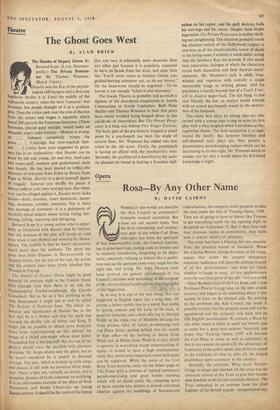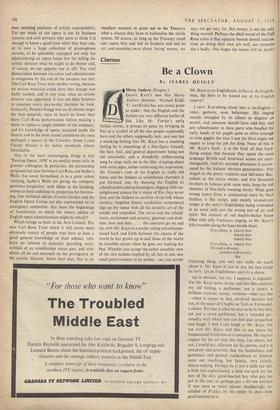Opera
Rosa—By Any Other Name
By DAVID CAIRNS
NORMALLY one would not describe the Arts Council as everybody's favourite musical institution. But these are not normal times. Not they east stimulating and satisfac- tory part of the whole Carl Rosa imbroglio has been the spectacle of that statesmanlike body, the Council uncross- ing its pinstriped legs, casting aside its bowler and its -masterly irresolution, forgetting to be diplo- matic, positively refusing to behave like a gentle- man and see the question from every angle but the right one, and acting. Mr. John Denison must have received the general approbation of the. Council's decision with something of the emotion of Mr. Selwyn Lloyd faced with the cheering ranks of the Opponition. ; In its way it is one of the best things that has happened in English opera for a long time. Of course, a hearty public row in a world that works by gossip, rumour and the knife in the back, is good for everyone, and a show offering Sir Donald Wolfit in the triple role of Macbeth defying the three witches, John of Gaunt prophesying ruin and Duke Senior putting behind him the sweets of high office—to say nothing of Dame Irene Ward cast as Dame Irene Ward in a part which is operatic in everything except understanding of opera—is bound to have a high entertainment value. But, much more importancsome solid gains can be registered. While the rump of the Carl Rosa Trust postures away on the letters page of The Times with a mixture of injured innocence, pseudo-moralising and good honest humbug which will no doubt tickle the crusading spirit of those citizens Who profess to defend individual liberties against the meddlings of bureaucratic
centralisation, the company itself prepares to take the road under the title of 'Touring Opera, 1958. They are all going to have to labour like Trojans to get everything ready for the opening night in Bradford on September 15. But if they have lost four precious weeks to controversy, they have won a crucial victory of principle.
The crisis has been a blessing for two reasons. First, the practical matter of standards. When Mr. Charles Wilson, acting chairman of the rump, argues that under the present emergency measures 'audiences will have the dubious benefit of ad hoc performances,' one does not know whether to laugh or weep. Ad hoc performances were the one fixed point of the old—and not so old —Marx Brothers days of the Carl Rosa, and it was Professor Procter-Gregg who, as the new artistic director, had begun to do something about it last season, at least on the musical side. By sticking to the professor the Arts Council has made it possible to hope that the progress made will not be squandered and the company sink back into its Old English parochialism. At present, a Rosa by any other name is likely to smell not merely just as sweet but a great deal sweeter. Naturally one hopes that 'Touring Opera, 1958' will become the Carl Rosa in name as well as substance, so that it can resume the good will, the advantages of familiarity in the public mind, and all that is sound in the traditions of what is, after all, the longest established opera company in the country.
Secondly, the principle. What drove Procter- ,Gregg to resign and touched off the crisis was the obstinate refusal of the Trust to give him reason- able freedom to do his job as artistic director. The Trust embodied in an extreme form the chief bugbear of the British system—inexperienced lay- men usurping positions of artistic responsibility. Far too much of our opera is run by business tycoons and civil servants who seem to think it is enough to know a good tune when they hear one, or to own a large collection of gramophone records, to be splendidly equipped not only for administering an opera house but for telling the artistic director what he ought to do (better still, of course, do not appoint one at all). The vital demarcation between intendant and administrator is overgrown by the cult of the amateur run riot. The Carl Rosa Trust were doubly wrong, because no serious musician could deny that change was badly needed, and in any case, once an artistic director was appointed, it was not their business to question every day-to-day decision he took. Ironically, Procter-Gregg was an ill-chosen target for their pinprick, since he heard no fewer than thirty Carl Rosa performances before making a move to replace a single member of the company, and his knowledge of opera, acquired inside the theatre and in the most varied conditions (he once managed a season in the Coventry Street. Lyons Corner House) is by native standards almost formidable.
One of the most encouraging things is that 'Touring Opera, 1958' is on cordial terms with its grander colleagues. In particular, the partnership proposed last year between Carl Rosa and Sadler's Wells, but never formalised, is to a great extent working. Sadler's Wells are giving the company generous hospitality, with offices in the building, rooms to hold auditions in, properties for borrow- ing, free technical advice. Covent Garden and the English Opera Group are also represented on its emergency committee. Are these the beginnings of foundations on which the rickety edifice of English opera administration might be rebuilt?
Which brings us back to the Arts Council. The new Carl Rosa Trust which -it will create must obviously consist of people who have at least a good general knowledge of their subject, who have no interest in jealously guarding every wrinkle of an antediluvian status quo, and who above all do not encroach on the prerogative of the artistic director. More than that, this is an excellent moment to point out to the Treasury what a chance they have to rationalise the whole system. Of course, so long as the Treasury mind sees opera first and last as business and not as art, and mumbles away about 'losing' money, we may not get very far. But money is not the only thing wanted. Perhaps the chief moral of the Carl Rosa crisis is that operatic boards should concen- trate on doing their own job well, not someone else's badly. One hopes the lesson will be learnt.































 Previous page
Previous page